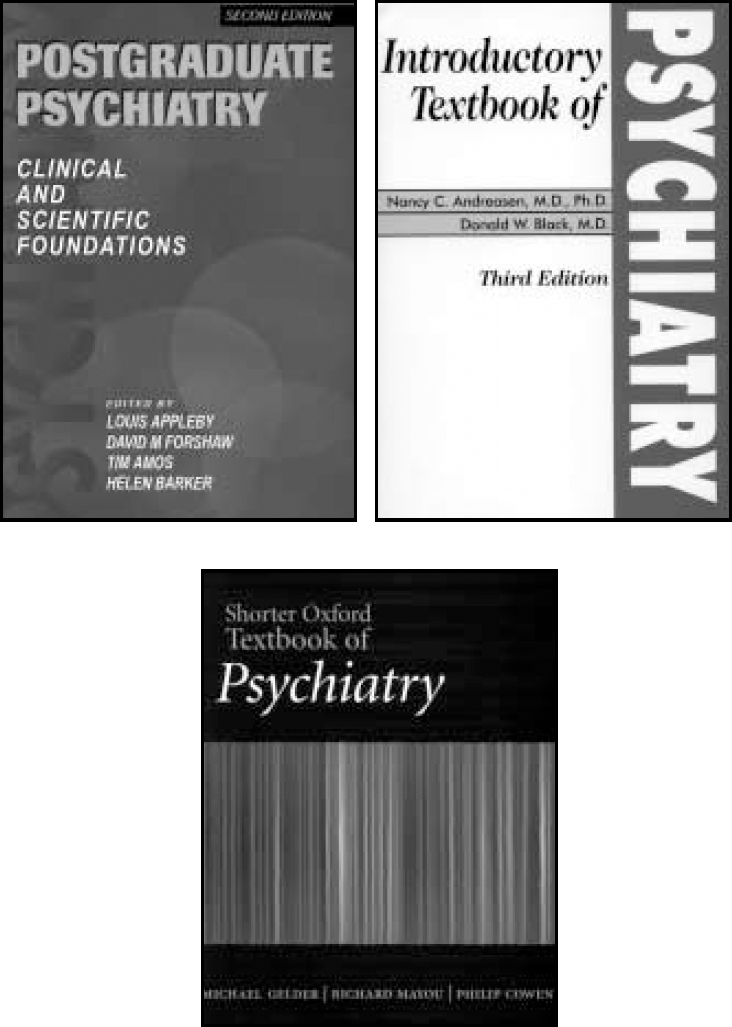
The number of general psychiatry textbooks seems endless, and one wonders what motivates writers, editors and publishers to continue to churn them out. With the advent of easily available and highly topical information through the internet and review journals, and the proliferation of evidence-based and problem-based learning, general textbooks seem less relevant than before. Despite this, most students and trainees seem keen on having a core textbook to act as a basis for their study, frequently supplemented with smaller, more specialist or ‘list’ books, which are crammed with information but little else. This state of affairs is reinforced by the all-pervasive influence of membership examinations.
The three textbooks under review each provide the reader with a useful summary of psychiatric knowledge at advanced undergraduate and postgraduate level, but in style and in content they are remarkably different.
Postgraduate Psychiatry, the outsider and least well-known of the three, is an edited text with contributors, as you might expect from its mixed pedigree, coming mainly from Manchester and the Institute of Psychiatry in London. It is wide-ranging in content, but I was left with the impression that it didn't quite know what it wanted to be: a full-length textbook with all that that implies, or a concise handbook providing lists of information but limited in detail. Its focused approach left little room for debate, but trainees looking for straight answers to multiple-choice questions may appreciate this. In appearance, it's a bit utilitarian, with an unattractive and old-fashioned layout. It is firmly centred in the UK and very much geared towards the new syllabus of the Royal College of Psychiatrists' membership examination. Indeed, the appendix includes useful advice on how to approach the examinations. The text tends to provide too much information on UK-specific topics, such as the evolution of UK mental health legislation, to the detriment of more universally relevant concepts such as ethical considerations surrounding compulsory treatment. The chapters on basic sciences, the ‘scientific foundations’ of the subtitle, are excellent, ensuring that the book is relevant to Part I of the membership examination as well as Part II.
The Introductory Textbook of Psychiatry is now in its third edition. It has been expertly coauthored by Andreasen & Black to give a well-written and attractively produced text that is bursting with information. The scope of the text is remarkably broad, from the historical underpinnings of psychiatry to more recent developments in evaluation and treatment. The inclusion of clinical vignettes and an appendix that provides a range of rating scales and questionnaires adds interest and usefulness. Whole chapters are devoted to topics such as AIDS and laboratory testing (including neuroimaging and neuropsychometry), which mean that the book can be dipped into without much cross-referencing. However, it is not without its problems for the European reader. Just as Postgraduate Psychiatry is firmly based in the UK, so this text is very much oriented towards the North American market. Every relevant chapter slavishly lists the DSM-IV-TR criteria for psychiatric syndromes and the chapter on diagnosis and classification barely mentions anything else. European literature and the ICD hardly get a look-in. Not surprisingly, prominence is given to syndromes that are more likely to be diagnosed in North America than anywhere else in the world. For example, dissociative identity disorder (‘Cindy had received a diagnosis of multiple personality disorder, although in the past she had received diagnoses of chronic schizophrenia, borderline personality disorder, schizoaffective disorder, and bipolar disorder’: p. 395) is described without the scepticism seen in the other texts.
I wonder what more can be said about the Shorter Oxford Textbook of Psychiatry that hasn't already been said about its predecessors. It is actually the fourth edition of the classic Oxford textbook, its name changed to take into account the publication of its longer and more comprehensive stable-mate, the New Oxford Textbook of Psychiatry (Reference Gelder, López-Ibor and AndreasenGelder et al, 2000). Shorter it may be in name, but it is by far the longest of the three books under review, with more than 1000 pages of text crammed with information in an easy-to-read format. The three authors are supported by a group of expert chapter advisors, which ensures that information is always topical, while consistency of style is maintained. The layout is clear and easy to navigate, and the use of tables, boxes and graphs allows efficient use of space and easy access. It is bang up to date on current talking points such as evidence-based psychiatry and ethics and mental health. The Shorter Oxford Textbook is truly balanced, giving equal prominence to ICD and DMS — often with direct comparisons — and therefore has universal appeal. This will no doubt contribute to the increasing consistency (some might say uniformity) of psychiatric practice worldwide. This book is perfect fodder in preparing for membership examinations — it is comprehensive and relevant, while at the same time being accessible and fluent.
It would appear that, for the time being at least, the textbook is alive and well. In the current three-horse race the clear winner is the Shorter Oxford Textbook, with the Introductory Textbook a close second.



eLetters
No eLetters have been published for this article.